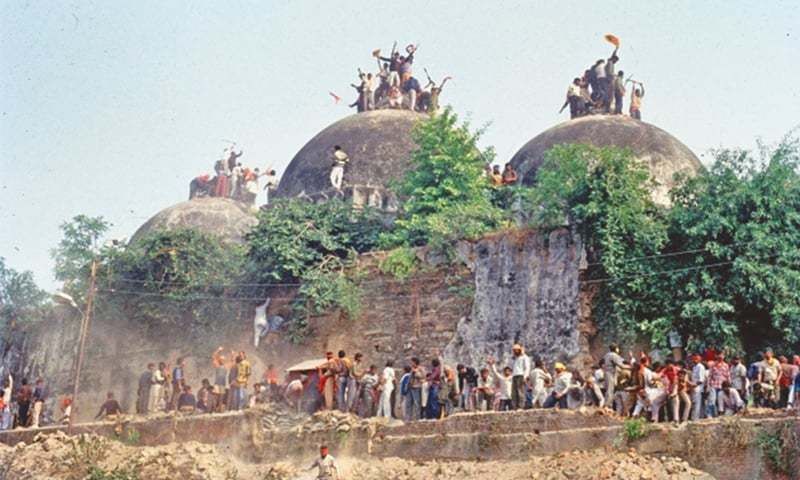Radical Socialist
Posted August 25, 2020

On August 5, 2020 Indian Prime Minister Narendra Modi performed the Bhoomi Pujan ceremony and laid the foundation stone of the Ram Temple to be built on the ruins of the Babri Mosque in Ayodhya, India. On December 6, 1992 the mosque was destroyed by a mob of Hindu nationalist supporters of the Rashtriya Swayamsevak Sangh (RSS), the fascist movement behind Modi’s government. In this article Radical Socialist, the Indian organization associated with the Fourth International, explains the significance of the event and prospects for the future.
August 5th will go down in Indian history as the day aggressive, chauvinistic nationalism, in its most fascistic form, but also with a deeper implantation in society than any other ultra-right fascist-type force, succeeded in throttling the First Indian Republic.
It is incontestable that the constitution, the political practices, of independent India always had a Hindu, and Brahminical tilt. However, what was one element among many became, in the hands of the RSS, and the entire range of political and ‘socio-cultural’ organisations it floated, the core and overwhelming thrust. That is why, on one hand, the BJP [Bharatiya Janata Party, the RSS-sponsored governing party] has been able to claim the nationalist high ground, and on the other hand, the Congress and other bourgeois parties have not been able to, and cannot, resist them on principled grounds. Rather than upholding secular principles, the Congress is currently competing with BJP over the ownership of Ram.
August 5th has been chosen deliberately as the date for the bhoomi puja [ceremony to begin construction] of the Ram Temple to come up. One year back, it was on August 5th that by a total disregard for even India’s previous, scarcely democratic procedures in Jammu and Kashmir, that the residual autonomy of the province was finally and totally smashed, by illegally turning it into two Union Territories. In the name of integration of the province into India, this marked the final step in an all out colonisation, since now the land, the resources of the province were up for grabs in a way they could not be done in the past, and the relatively progressive reforms of the early Abdullah regime were set to be overturned. Also, for an entire year, Kashmir has been under total despotism with the Supreme Court accepting claims made by the government, so that all arms of the state are united.
By linking the same date for the bhoomi puja, a whole set of coded messages are being sent out. This temple is being constructed through a judgement, whereby India’s Supreme Court admitted that a mosque had been destroyed in a criminal action, but still went on to tell the government to spend public money to build a religious institution for the majority community. Each step of the verdict was thus a blow against the principles of secularism. By choosing August 5th as the date, the Central Government is signalling that its actions are in one line. Muslim majority Kashmir is threatened with forced population changes in a bid to silence the decades long struggles there. The nation is being identified in an unabashed way with aggressive Hindutva [Hindu nationalist] politics, and with a Brahminical, north Indian brand of Hinduism.
There is no doubt that people will continue to fight oppression and exploitation. But the entire record of the past decades show, that unless India fights for the rights of Kashmir, India cannot get democracy, justice, social progress anywhere. The toiling people, workers and peasants, dalits and adivasis and other oppressed communities, women and other marginalised and oppressed genders, have to unite, have to come out of the hegemony of bourgeois politics, and Brahminical-Hindutva ideology.
They have to build struggles that do not create hierarchies according to one so called main enemy, in the name of fighting whom, all special oppressions, all class exploitation must be forgotten. That is how bourgeois politics and its tail-ending by the reformist left for the entire period since the Emergency of 1975-77 has led us into this destructive situation.
There is no short cut. The struggle will be long. But the Hindutva triumphs of August 5th can only be fought back by unity based on real understanding of each oppression, the building of a mass united front, and a rejection of all bourgeois parties.
Socialism is the only alternative to barbarism. Not the pipe dream of holding aloft the flag of a spurious real bourgeois democracy abandoned by the bourgeoisie, but the need is for a sustained and protracted struggle for a proletarian revolution under specific Indian conditions, which is possible only by becoming the voice of all the oppressed and exploited.
